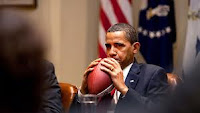 That is the question.
That is the question.Today on ESPN’s program Outside The Lines, members from many sides of the NFL met to discuss issues currently affecting the NFL Lockout.
Darren Woodson, 5 time Pro Bowl selection, spoke on behalf of the players. Tom Condon, former NFL player and current lawyer, on behalf of the agents. Andrew Brandt, former Green Bay Packers executive, represented NFL management. Herm Edwards, former NFL Head Coach, shared his view from a coaches perspective. ESPN insider Adam Shefter, summed up the guest list from the media’s angle.

Each faction gave insight on the pitfalls of the over 4 months of arguments between the millionaires and the billionaires. The show attempted to steer toward the future, and how the lockout will affect the upcoming season.
The show was informative, but lacked a few key elements.
 A glaring absence inside the panel of guests left clues which may point toward a possible solution. No where to be found amongst the guests was “A Football Fan”. The football fan, the foundation of the entire system, the entity which feeds whole sport, was all but forgotten.
A glaring absence inside the panel of guests left clues which may point toward a possible solution. No where to be found amongst the guests was “A Football Fan”. The football fan, the foundation of the entire system, the entity which feeds whole sport, was all but forgotten.ESPN’s mistake was not intentional, but unfortunately is a recurring error in today’s society. It’s not as if the Taxpayer gets a vote in congress.
 This is a microcosm of what has become the issue within our sports world and our world economy. Those with a vested interest fail to represent the foundation of the entire process.
This is a microcosm of what has become the issue within our sports world and our world economy. Those with a vested interest fail to represent the foundation of the entire process.
But that isn’t what this blog is about.
There is a larger voice than the fan, one which cannot defend its position.

What if the Sport of Football could speak for itself?
If you watch television or have bothered to pay attention to all this off-season drama, you notice opinions from all sides. Players, owners, coaches, and fans have all shared their view on the topic. Not once have we heard the answer. Not once have we heard someone speak on the side of one variable which affects all of the parties involved.
If Lombardi was here he would remind us of what our intention should be.
The Sport. The Sport of football is what is important here. The sport of football is what has clearly been forgotten. People argue and say it’s a business. But is it? It was a sport before it became a business. The business relies on the sport, the sport does not rely on the business. To prove this, all you have to do is head to a high school football field this fall and see the game being played, in an organized fashion or otherwise. You will see kids playing for the love of the game, for the competition it breeds.
Somewhere along the line the rewards the sport had to offer were corrupted. No one person is to blame, no one group of men is at fault, but we are all responsible.
Each member of each group is to blame. The owners are at fault because they should know that protecting their investment means protecting the sport, Football. The players are at fault because many presently look at what they can take from the sport, rather than what they can give to it. The lawyers and agents are at fault because they silently sit back and watch the two sides bicker and know their eventual paycheck will arrive no matter what the outcome. The media is to blame because of it’s inability to stick to one side of any argument. Any party which is willing to play both sides of the fence can never be truly about a solution to any problem. Last but not least, the fan is to blame for accepting the entire process. The fan allows the mistreatment of the sport. The fan is the foundation, the collective idea that has accepted the present we find ourselves in.
What is the solution? What would Lombardi say?
He would say we need to protect the sport. We need to ask, “Is this good for the sport of football”? in each and every situation. If it isn’t, then we change our approach and adapt.
If we protect the integrity of the sport the rest of the equation will follow suit. If we attempt to solve problems which neglect our intention of putting the sport first, we will fail every time.

Owners need to set the example. Owners like Al Davis who have consistently made decisions which were in the best interest of the sport rather than himself.
Players need to display and practice that example. Players like Pat Tillman, who refused a larger contract to show his loyalty to his team, his city, and his country.
Coaches need to change their approach. Coaches like Bill Walsh, a man who would rather retire than to bench a man who afforded him his success.
We need people who give more than take to the sport which so many of us have come to enjoy. We find ourselves in an contradictory place, as men now look to take more than the sport has to give.
If Lombardi was here it would be nice to imagine him sitting alongside of former President Kennedy and saying: “Ask not what football can do for you, but what you can do for football.”
No comments:
Post a Comment